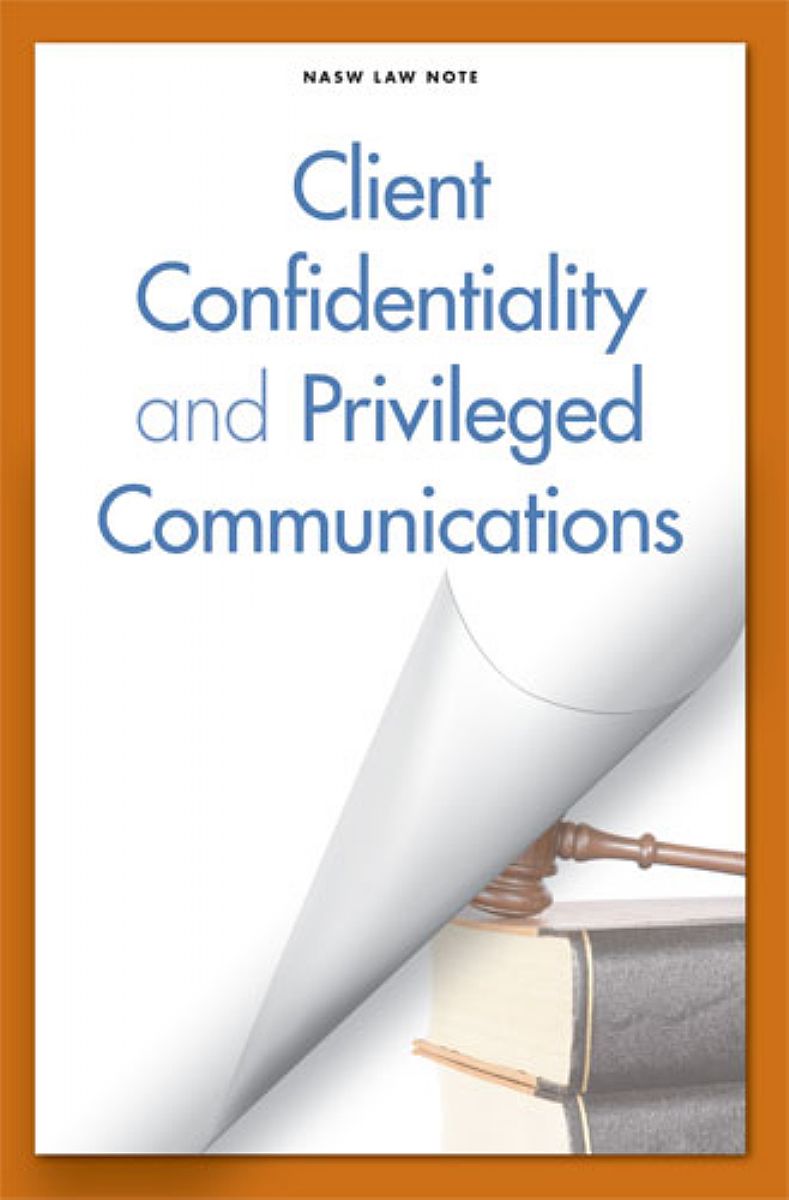
NASW Law Note: Client Confidentiality and Privileged Communications
Page Count: 45
ISBN: 978-0-87101-427-6
Published: 2011
Item Number: 4276
$22.99
Client Confidentiality and Privileged Communications is part of a series of General Counsel Law Notes written with the support of the NASW Legal Defense Fund.
Applying the concepts of confidentiality and privilege to the professional services provided by social workers, this law note covers federal health privacy laws and regulations, state law standards, and practitioners’ ethical obligations in the following areas:
- confidentiality requirements (including scope of confidentiality and obtaining client consent),
- situations in which disclosure of confidential information is required or permitted (including HIPAA exceptions to confidentiality and instances in which clients are a danger to themselves or others), and
- privilege and the release of client information in legal proceedings.
Also included in this indispensible volume are Section 1.07 of the NASW Code of Ethics (Privacy and Confidentiality); a review of the Substance Abuse and Mental Health Services Administration’s Frequently Asked Questions regarding the application of substance abuse confidentiality regulations to health information exchange; a comprehensive, state-by-state chart of social worker-client privilege and confidentiality laws; and an extensive bibliography.
In the current era of rapid change in information technology capacity, society is undergoing a paradigm shift in expectations regarding privacy; however, the fundamental need for confidentiality remains a lynchpin of successful mental health treatment and effective social work intervention. The confidentiality of client communications is one of the social work profession’s ethical foundations, and it is a legal obligation in most states.
By providing practitioners not only with a thorough grounding in this area but the means to work toward increasing universality and uniformity in the state laws that protect clients’ rights, Client Confidentiality and Privileged Communications will empower social workers to ideally serve the needs of their clients and to further the advancement of the profession as a whole.
The NASW General Counsel Law Note series provides information to social workers about legal topics of concern to the social work profession. The Law Notes are developed with the support and financial assistance of the NASW Legal Defense Fund (LDF). Contents vary by title, but generally include legal information, civil procedure, contracts, legal methods, and glossaries. Checklists, timetables, case law, and other resources help social workers understand and exercise their legal rights and responsibilities as well as the rights and responsibilities of their clients.
Introduction
Confidentiality Requirements
Scope of Confidentiality
Obtaining Client Consent
Situations Requiring or Permitting Disclosure of a Patient’s Confidential Information
HIPAA Exceptions to Confidentiality
Duty to Control or Warn about a Dangerous Patient
Past Criminal Acts
Child Abuse or Neglect
Preventing Harm to the Client
HIV Reporting
Alcohol or Drug Rehabilitation Programs Receiving Federal Funds
Privilege and the Release of Client Information in Legal Proceedings
Federal Treatment of Privilege
The Dangerous Patient Exception
State Treatment of Privilege
Conclusion
Appendix A: NASW Code of Ethics: 1.07 Privacy and Confidentiality
Appendix B: Review of SAMHSA’s Frequently Asked Questions: Applying the Substance Abuse Confidentiality Regulations to Health Information Exchange
Appendix C: Social Worker – Client Privilege and Confidentiality Laws
Appendix D: Bibliography
A majority of the legal concerns raised by individual National Association of Social Workers [NASW] members involve questions relating to the privacy of clients’ mental health treatment information. For many people, the acronym “HIPAA” (Health Insurance Portability and Accountability Act) has become synonymous with health care privacy; however, the underlying principles of confidentiality and privilege remain fundamental to any analysis of patient privacy. Applying the concepts of confidentiality and privilege to the professional services provided by social workers requires an understanding of federal health privacy laws and regulations, as well as state law standards and ethical obligations. This Law Note discusses the two principles and outlines some of the exceptions applicable to them, particularly in the context of clinical social work practice. In an era of rapid change in information technology capacity, society is experiencing a paradigm shift that impacts expectations about privacy; however, the fundamental need for confidentiality remains as a lynchpin to successful mental health treatment and effective social worker interventions.
